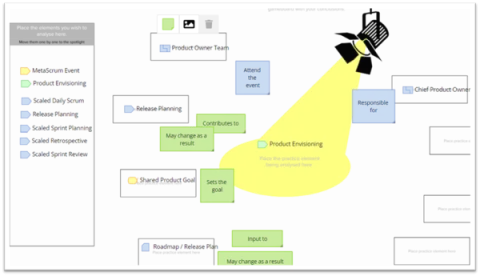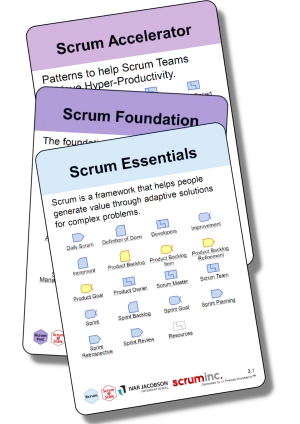Serious games are agile games, that do not have entertainment, enjoyment or fun as their primary purpose.
There are many examples of serious games in the video game industry, but any game that has a serious purpose can be a serious game. For instance; card games, team games, sorting games or timed activities. The book and website Gamestorming describes dozens of ‘games’ that are played in person and address business problems in creative, engaging and most importantly, effective ways. Some examples you may recognize are SWOT Analysis, Brainwriting, World Café and Affinity Mapping.
We learn better Agile through games
Describing these types of activities as games isn’t just a linguistic quirk. It is also important when we consider what playing a game means in terms of our behavior and how we learn. Humans learn better through playing games.
Playing games helps us learn better in three specific ways:
- Focus and Engagement – During gameplay, we are focused on the task. We don’t get distracted by other responsibilities. In this focused state, we aren’t attempting to multitask. We absorb and process information better and make better decisions. When there is a time constraint, this can build healthy stress as we focus harder on achieving the outcome in the time remaining. Games provide ‘architectures for engagement’, and having highly engaged people is an important factor in achieving good results in knowledge working tasks.
- Collaboration – Games where people work together encourage collaboration. This can unlock the group’s collective intelligence, use diversity of the participants to maximize creativity and innovation, and take advantage of the ‘Wisdom of the Crowd’ to get more accurate insights. This is maximized with good gameplay design, but can be compromised by poor design or facilitation. For example, allowing the Highest Paid Person’s Opinion (the HiPPO) to dominate.
- Iterative Improvement – Games can provide safe spaces for experimentation and creativity and make it easy to build in iterative improvement. Using techniques like 1-2-4-ALL or poker style simultaneous reveal allow teams to start with an answer and iterate over several rounds until they reach consensus. This iteration and continuous improvement results in better quality results and because people have spent more time thinking about it, the knowledge is embedded more deeply.
Serious Agile Games with Essence
Creating and playing games for serious, professional purposes is made much easier when the attributes and elements of the business decisions you are making lend themselves to gameplay.
With Essence and essentialized practices, this is built in as a core feature. Every practice in Essence is broken down into a number of discrete elements. Each of these is written in such a way that it is simple enough to be described and understood as a headline; and concise enough that the pertinent details can fit onto a single card.
This means that every Essence practice can be presented as a set of Poker sized cards. These cards are therefore an ideal form factor to use in serious games, either physically or in an electronic form.
There are numerous games that we can design around the Essence cards, including games that help us assess state, test our understanding of a practice, agree roles and responsibilities, identify risks, inspect and adapt, prioritize work, to name a few. We can also design gaming patterns that can be applied to multiple types of practice and we encourage people to come up with their own games.
When we combine card-style games with inclusive and creative facilitation practices, we can unlock much of the power of serious games and apply it to the serious business of building stronger teams and developing better products.
This section describes a number of generic and practice specific games that can be played with the Essence cards.
Many of the games are easily played within Essence WorkBench™ (formerly TeamSpace), either directly or using a GameBoard. There are GameBoard templates for many of these games that can be used or adapted.
If you are not using Essence WorkBench™, for most games you will need:
- Physical or Electronic cards or tokens for the practice(s) you are using
- Physical or Electronic canvas of some sort such as flipchart, whiteboard, Mural or Miro.


